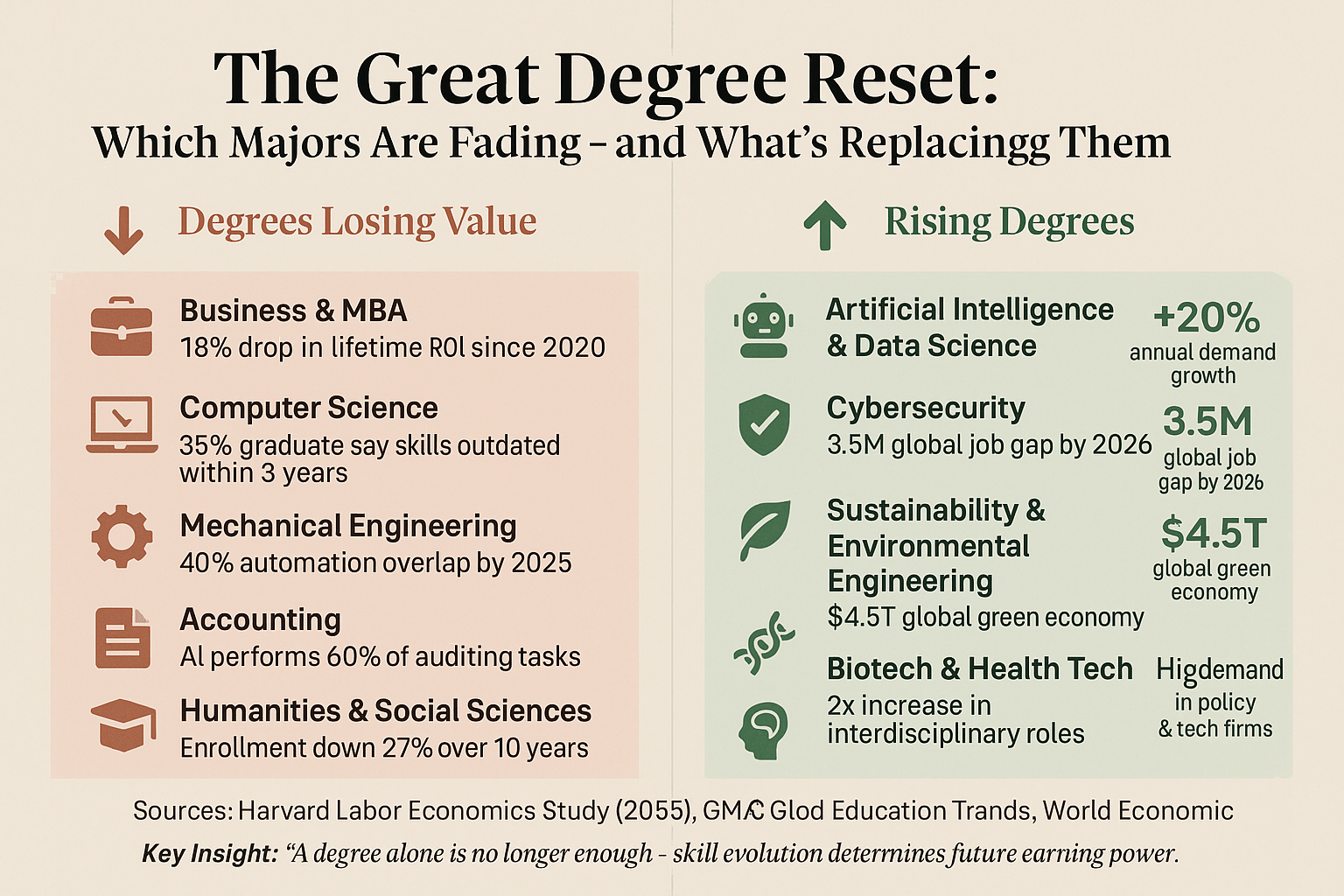Jasmine Grover Study Abroad Expert
Study Abroad Expert | Updated On - Oct 25, 2025
Harvard University’s latest research warns that the career value of several once-prestigious degrees is rapidly fading. Automation, artificial intelligence (AI), and the shift toward skill-based hiring are reshaping the job market — leaving some degrees struggling to deliver the same return on investment they once promised.
According to Harvard University’s labor economists David J. Deming and Kadeem Noray, graduates in fast-changing fields like computer science, engineering, and business see an initial earnings boost early in their careers, but that advantage fades within years if they don’t keep updating their skills.
“The myth that a degree guarantees lifelong job security no longer holds true,” the Harvard report concludes.

Check Out Latest Study Abroad News for Indian Students
- US Sees 19% Drop in International Student Arrivals in August 2025 Amid Stricter Visa Rules
- New Zealand Emerges as a Top Study Destination for Indian Students
- Japan Eyes 15,000 Indian Students in 5 Years, Promotes Scholarships, English-Taught Programs, and Industry Links
- UK Tightens Visa and English Language Rules: Students and Workers Face Higher Standards from 2026
- UK Expands High Potential Individual (HPI) Visa
- Global MBA Applications Rise 7% in 2025, Driven by AI Integration and Shifting Study Destinations: GMAC Survey
Why Are Degrees Losing Value?
The study explains that technological disruption and credential saturation are the two biggest reasons behind the erosion in value.
- Automation & AI: Core skills in engineering, IT, and finance are becoming obsolete faster than universities can update their curricula.
- Degree Inflation: Too many graduates with similar qualifications are competing for fewer roles.
- Skill-Based Hiring: Employers now prefer candidates who can demonstrate job-ready abilities over those with only academic credentials.
Harvard’s findings align with global education data showing that the ROI (Return on Investment) for many undergraduate and even postgraduate degrees has dropped significantly over the past decade.
The 10 College Degrees Losing Value Fast
| Degree | Why It’s Losing Value? |
|---|---|
| Business Administration (including MBA) | Oversupply of graduates and employers preferring niche expertise (finance, analytics, or entrepreneurship) over general management degrees. |
| Computer Science | Skills in programming and development expire quickly as automation and generative AI evolve. Constant upskilling is essential. |
| Mechanical Engineering | Automation, AI-driven design, and overseas outsourcing have reduced traditional engineering roles. |
| Accounting | AI-based financial software now performs many auditing and bookkeeping tasks, shrinking the need for manual work. |
| Biochemistry | Limited career growth without advanced research or medical specialization. |
| Psychology (Undergraduate) | Offers few direct job options; most roles require a master’s or doctoral degree. |
| English Literature & Humanities | Declining enrollments and fewer professional pathways outside education and writing. |
| Sociology & Social Sciences | Weak alignment between course content and job market demand. |
| History | Narrow job prospects and low mid-career wage growth. |
| Philosophy | Valued for critical thinking, but lacks direct commercial application without further professional study. |
Harvard’s Key Findings (2025 Update)
- Degree ROI: Average lifetime return from general business and liberal arts programs down 18% since 2020.
- Automation Impact: Nearly half of traditional engineering functions now involve AI-assisted design tools.
- Reskilling Urgency: 1 in 3 computer science graduates say their technical skills become outdated within three years.
- Humanities Graduates: Over 60% work in unrelated fields due to limited market demand.
The “Degree Reset”: From Credentials to Capabilities
A Harvard Business School report calls this shift the “Degree Reset.” Employers worldwide are removing mandatory degree requirements and instead assessing candidates on certifications, project portfolios, and practical experience.
This trend means that career growth now depends less on your major and more on your ability to reskill and adapt.
Also check:
- DAAD International Postgraduate Scholarship 2026 Applications Open for Indian Students
- Study Abroad 2025: Indian Students Shift to UAE, Russia, Kazakhstan, and Turkey for Affordable Degrees
- UK Home Office Grants Extra Visas to UCL After Record Surge in International Student Applications
- Nottingham Trent University Announces 50% Scholarships for Indian Students – Apply by November 12 for January 2026 Intake
- France Sees 17% Rise in Indian Students, Aims for 30,000 by 2030
- THE World University Rankings 2026 Released
Degrees and Fields Gaining Value
While some degrees are declining in demand, others are surging thanks to digital transformation and global challenges.
| Emerging Degree Fields | Why They’re Gaining Value |
|---|---|
| Data Science & AI | Explosive demand across industries, with salaries growing up to 20% annually. |
| Cybersecurity & Information Assurance | Rising global data threats make this one of the most recession-proof fields. |
| Environmental & Sustainable Engineering | Governments and companies investing heavily in green infrastructure. |
| Health Technology & Biotechnology | Merging of life sciences with AI creates new, high-paying roles. |
| Behavioral Economics & Applied Psychology | Combines human behavior with analytics, vital in marketing and policy-making. |
What Students Should Do?
Harvard researchers emphasize that the future of education depends on continuous learning rather than one-time degrees.
Students can protect their career value by:
- Pairing their degree with industry-recognized certifications (like AWS, CFA, or Google Cloud).
- Choosing interdisciplinary programs that blend tech and business skills.
- Opting for universities offering AI-integrated, project-based learning.
- Prioritizing internships and work-integrated programs to build real-world experience.
The Harvard study reinforces a growing truth: a degree alone isn’t enough anymore. In the AI economy, your willingness to learn, adapt, and upskill continuously will decide your success far more than the title printed on your diploma.











Comments